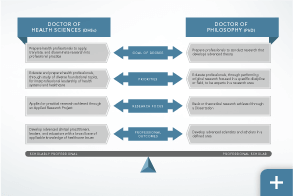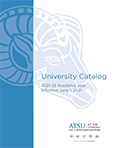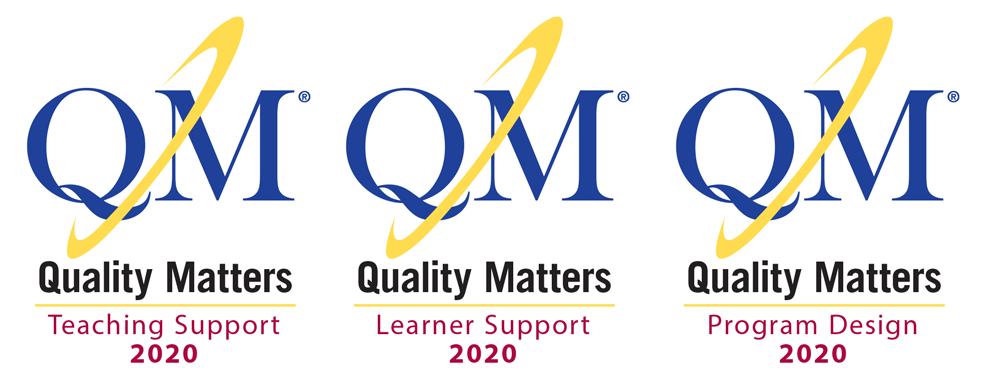Doctor of Health Sciences Degree Online
Program Info
Doctor of Health Sciences Degree Online

Online Healthcare Degree
The A.T. Still University (ATSU) Doctor of Health Sciences (DHSc) online program prepares students to better understand and effectively manage and evaluate solutions to the ongoing challenges of healthcare access, cost and quality.
This advanced online health science degree program provides health professionals with the knowledge and skills to excel in project management, decision-making, organizational leadership, establishing evidence-based standards and gaining competencies to apply research to professional practice.
Offered through the ATSU College of Graduate Health Studies (CGHS), the health science degree online program consists of 70 credit-hours of study.
Students have the opportunity to focus on one of three concentration areas: Global Health, Leadership and Organizational Behavior, or Fundamentals of Education. The health science online degree program promotes application of research to professional practice through completion of an applied research project.
Doctor of Health Sciences Program Outcomes
According to a recent survey of ATSU Doctor of Health Sciences alumni, there is consensus among graduates that the program prepared them for leadership roles in healthcare and academia. Alumni agree that the online health sciences degree program:
- Prepared them to critically review literature (100%)
- Strengthened their skills in applying research (98%)
- Enhanced their ability to appreciate diverse philosophies (98%)
- Developed their skills to write more effectively (95%)
- Equipped them for the future of healthcare (88%)
- Readied them for leadership roles (85%)
Doctor of Health Sciences (DHSc) vs. Doctor of Philosophy (PhD)
 The Doctor of Health Sciences degree is a unique approach to doctorate level health education. The ATSU Doctor of Health Sciences degree provides interdisciplinary scholarship and added value to health professionals in comparison to the traditional PhD.
The Doctor of Health Sciences degree is a unique approach to doctorate level health education. The ATSU Doctor of Health Sciences degree provides interdisciplinary scholarship and added value to health professionals in comparison to the traditional PhD.
 Related Videos
Related Videos
Health Sciences Purpose/Mission/Values +
-
DHSc Program Purpose Statement
The Doctor of Health Sciences (DHSc) program provides a rigorous interdisciplinary education for healthcare professionals, preparing students to be effective leaders and change agents in a variety of health settings. The program offers innovative curriculum in a flexible, asynchronous format to best meet student needs. Courses are facilitated by experienced faculty through an interdisciplinary and interprofessional approach. Coursework prepares students to critically analyze ongoing domestic and global challenges of access, cost, education and quality in healthcare, and builds competencies to skillfully evaluate, plan and implement solutions to these challenges.
DHSc Vision
The DHSc program has adopted the vision statement of the College of Graduate Heath Studies, adapting it to the program:
The DHSc program will be the preeminent online program for leaders in the health professions. We will provide a contemporary and flexible curriculum that empowers our students to translate knowledge to meet the growing needs of domestic and global health and wellness.
DHSc Values
The DHSc program has adopted the values of the College of Graduate Health Studies:
- Leadership: We value leadership development for our students, faculty, and staff and encourage participation in community and professional service.
- Integrity: We value the highest ethical principles of fairness and honesty in all of our interactions.
- Scholarship: We value critical thinking and the generation of ideas through innovation and analysis.
- Diversity: We value differences among people and their personal and professional perspectives.
- Interprofessional education: We value the combined contributions of our educational community and work to achieve an environment of teamwork and collaboration.
- Innovation: We value a continual and aggressive push to develop new and efficient mechanisms for learning, teaching, and technological delivery.
DHSc Goals
Goals of the DHSc program are to provide an online environment that:
- Promotes diversity of student experiences
- Fosters student success
- Honors professionalism and ethical practice
- Supports a curriculum that develops critical and analytical thinking skills through an integrative approach of instruction, research, and evidence-based resources
- Promotes and supports excellence in faculty performance in teaching, scholarship, and service
DHSc Outcomes
- Demonstrate advanced knowledge in health sciences fields, scholarship, and evidence-based practice.
- Demonstrate knowledge and skills for designing, conducting, analyzing and disseminating health sciences research.
- Demonstrate knowledge in critical analytical thinking skills in foundational areas of health sciences.
- Demonstrate advanced and effective skills in communication, professionalism, ethical practice, systematic thought, and writing.
-
University Catalog+

The ATSU Doctor of Health Sciences degree post-professional program offers focused, interprofessional learning in a flexible, online environment tailored for busy healthcare professionals. The online health science degree is achievable in three years, has various areas to concentrate learning and 100 percent of study can be completed online.
Read the University Catalog to learn more about the Doctor of Health Sciences online program and university.
-
Accreditation +
-
A.T. Still University is accredited by the Higher Learning Commission
230 S. LaSalle Street, Suite 7-500,
Chicago, IL 60604Phone: 800.621.7440 | Fax: 312.263.7462
Email: info@hlcommission.org
-
Career Advancement+
-
- Academic Educator
- Athletic Trainer
- Counselor
- Dental Hygienist
- Dietitian
- Health Specialist
- Healthcare Administrator
- Healthcare Consultant
- Pharmaceutical Researcher
- Medical Technician
- Registered Nurse
- Occupational Therapist
- Paramedic
- Pharmacist
- Physical Therapist
- Physician
- Physician Assistant
- Psychologist
- Public Health Administrator
- Respiratory Therapist
- Social Worker
- Speech Pathologist
-
-
Student Insights +
-
I think what best summarizes my choice of the DHSc was its direct relation to health sciences as opposed to some of the more arcane disciplines inherent in many PhD programs. This is not an exercise in merely obtaining a doctorate degree but in obtaining a degree which can actually further my educational and professional goals.
~Mark, ATSU DHSc student
The DHSc is the best of both worlds. It is the integration of both research and practice. It is the focus on applied research with the end goal to affect the delivery of healthcare.
~Melanie, ATSU DHSc student
I wanted more of a liberal and critical preparation approach to academics. The DHSc fits the need. It prepares us for clinical continuation, but has the applied portions of thinking infused with research.
~Debbie, ATSU DHSc student
-
Doctor of Health Sciences Degree Faculty
Five full-time and many adjunct faculty provide expert instruction within the health science online degree program. This structure provides students exposure to a variety of teaching styles and learning opportunities by a faculty with diverse healthcare-related backgrounds and experiences.
-
Dean +
-
-
 Don Altman, DDS, DHSc, EdD, MPH, MBA, MA
Don Altman, DDS, DHSc, EdD, MPH, MBA, MA
Dean

Don Altman, DDS, DHSc, EdD, MPH, MBA, MA, is the Dean of the College of Graduate Health Studies (CGHS) at A.T. Still University (ATSU). He also serves as director of public health at ATSU’s Arizona School of Dentistry & Oral Health (ATSU-ASDOH). Dr. Altman has been with ATSU since October 2006.
Dr. Altman graduated from the University of Texas Dental Branch (DDS) in 1983. He completed his Master of Public Health degree at the University of Texas School of Public Health in 1989 and became Board Certified in Dental Public Health in 1999. Dr. Altman completed his MBA at the University of Phoenix (2002) and a MA in Bioethics from Midwestern University (2004). He graduated with a Doctor in Health Science (DHSc) degree in March 2012 from the Arizona School of Health Sciences at A.T. Still University (ATSU-ASHS) and his EdD from Southern New Hampshire University in March 2016.
Dr. Altman has worked for The City of Houston, the State of Texas, the State of Arizona, as well as The Principal Financial Group. Dr. Altman’s public health experience includes: serving as President of the Arizona State Board Dental Examiners; serving as President of the Arizona Public Health Association; volunteering with Health Volunteers Overseas (Cambodia and Vietnam); Director of the National Oral Health Leadership Institute; and serving as the Consumer Representative to the Dental Products Panel for the Food and Drug Administration. On May 1, 2012 he was appointed as a Director to The American Board of Dental Public Health and is currently the president.
Dr. Altman’s research interests are currently centered on public health and higher education. He has published articles in the Journal of Dental Education, Journal of the American Dental Association, Public Health Reports, Special Care in Dentistry, and Community Dentistry and Oral Epidemiology.
-
-
-
Associate Dean Academics and Assessment +
-
-
 Jim Farris, PT, PhD
Jim Farris, PT, PhD
Jim Farris, PT, PhD, is the associate dean for academics and assessment in A.T. Still University’s College of Graduate Health Studies (ATSU-CGHS). Dr. Farris earned his bachelor’s degree in physical education in 1987, and master’s degree in exercise science in 1989, both from California State University, Fresno; as well as a bachelor’s degree in physical therapying 1999 from Arkansas State University. His doctoral degree was conferred by The Ohio State University in 1995, where his studies focused on exercise physiology and nutrition. His current scholarship efforts are aimed at cardiopulmonary fitness throughout the lifespan.
He joined ATSU in 2009, started his associate dean role in 2020, and is now in his 25th year of higher education and administration. Dr. Farris has over a decade of academic administration and assessment experience as a department chair and has strived for overall educational excellence in that role. He completed the American Physical Therapy Association’s Education Leadership Institute Fellowship, is an Educational Leadership Institute Fellow, and has served on the board of directors for the American Council of Academic Physical Therapy before joining ATSU-CGHS.
He enjoys serving the community, and one our nation’s most underserved populations, through his role as a clinical director for the FUNfitness program that is part of the Special Olympics Healthy Athlete’s program. His home is in the west where outdoor activity and sunshine is abundant. Work-life integration is a goal and he “sharpens the saw” through golfing, cycling, fishing, hiking, cooking, brewing, and yardwork.
-
-
-
Chair and Associate Professor +
-
-
 Kathleen DiCaprio, PhD
Kathleen DiCaprio, PhD

Kathleen DiCaprio, PhD, has been named chair for the Doctor of Health Sciences (DHSc) program in the ATSU College of Graduate Health Studies. She previously served as an assistant professor of microbiology and immunology at Touro College of Osteopathic Medicine in New York, as well as the director of content development and education at Oceania University of Medicine. In addition, she served as an instructor and curriculum consultant for Kaplan Medical.
Dr. DiCaprio has a history of teaching undergraduate, graduate, and medical courses in areas related to infectious diseases and infection control, immunology, public health, and emergency preparedness. She comes to ATSU with an impressive history as a faculty member and administrator in higher education of the medicine and the health sciences.
Dr. DiCaprio earned her BS in biochemistry from The College of Saint Rose and her PhD in pathology from Uniformed Services University of the Health Sciences. Her prior research focused on studying pathogenesis of maximum containment (Biosafety-level 4) viruses such as Ebola and Marburg in non-human primate models. Her research efforts contributed to the development of potential vaccines and therapeutics against these deadly viruses, and her work has been profiled in numerous publications and press releases.
-
-
Doctor of Health Sciences Degree Admissions
Requirements +
-
- Application:
- Completed and signed admissions application along with a nonrefundable application fee.
Academic:
- An accredited degree from a university recognized by the Council for Higher Education Accreditation (bachelor’s degree for masters programs and a master’s degree for doctoral programs). Applicants who graduated from a university outside the United States may have to provide a degree equivalency evaluation.*
- Official transcript from the qualifying degree-granting institution. For students using VA benefits transcripts for all institutions attended are required.
- Minimum Cumulative Grade Point Average (CGPA) of 2.5 (on a 4.0 scale) at the qualifying degree institution.
- Some degree programs may require experience or credentialing relevant to the field.
Elements of Success:
- A current resume.
- Completion of an essay.
- English Proficiency **
- Meet technology requirements.***
*Applicants who have graduated from a foreign college or university should submit acceptable evidence of U.S. degree/course equivalency. All course work taken at the foreign institution must be evaluated for American institution equivalence by one of the following services:
- World Education Services P.O. Box 5087 Bowling Green Station New York, NY 10274-5087 p: (212) 966-6311 f: (212) 739-6139 info@wes.org
- Educational Credential Evaluators, Inc. P.O. Box 514070 Milwaukee, WI 53203-3470 (414) 289-3400
- American Assn. of Collegiate Registrars & Admissions Officers One Dupont Circle, NW, Suite 520 Washington, DC 20036-1135 (202) 293-9161
- Josef Silny & Associates, Inc. International Education Consultants 7101 SW 102 Avenue Miami FL 33173 p: (305) 273 -1616 f: (305) 273 -1338 info@jsilny.com
- Intl. Education Research Foundation, Inc. PO Box 3665 Culver City, CA 90231-3665 (310) 258-9451
**Applicants are required to demonstrate proficiency in English when applying to A.T. Still University’s College of Graduate Studies. Written and spoken proficiency in the English language may be demonstrated by one of the following options:
- Option 1 - English is your first language.
- Option 2 - Graduated from a regionally accredited four year college/university in the United States with a BA/BS or graduate degree.
- Option 3 - You are demonstrating your English proficiency by submitting acceptable scores on the Test of English as a Foreign Language (TOEFL).
Acceptable minimal scores for CGHS applications are:
The Computer Based Test (CBT), Internet Based Test (iBT), or the Paper Based Test (PBT) are accepted. The following are the minimum required score based on test type:- CBT - minimum total score of 213 Minimum of 22/Reading Skills section | Minimum of 26/Writing Skills section
- iBT - minimum total score of 80 Minimum of 22/Reading Skills section | Minimum of 24/Writing Skills section
- PBT - minimum total score of 550 Minimum of 57/Reading Skills section | Minimum of 61/Writing Skills section
The TOEFL is administered by TOEFL/TSE Services, P.O. Box 6151, Princeton, NJ, 08541-6151, USA 609. 771.7100. A.T. Still University’s institutional code is 0339. Please be sure to include this information when you submit your application packet. TOEFL Educational Testing Services P.O. Box 6151 Princeton, NJ 08541-6151, 609.771.7100
***ATSU technology requirements - Application:
-
Application +
-

Review application deadline dates
For additional information contact an Enrollment Counselor:
877.626.5577 or cghsonlineadmissions@atsu.edu
-
Tuition+
-
Review tuition and fees for Doctor of Health Sciences program. Please note tuition and fees are subject to change.
-
Request Information+
-
Have a question for ATSU?
Submit an inquiry for more information on your program of interest.
MISSOURI CAMPUS
800 W. Jefferson Street
Kirksville, MO 63501
Phone: 877.626.5577
cghsonlineadmissions@atsu.edu
-
Financial Aid+
-
Federal financial assistance is available for qualifying students. For information about financial aid, visit ATSU’s Enrollment Services online or contact them at 866.626.2878 ext. 2019 or by email at enrollmentservices@atsu.edu.
-
The ATSU Family and Culture




Doctor of Health Sciences Curriculum Overview
The Doctor of Health Sciences (DHSc) online program consists of 70 credit-hours of study. The DHSc degree curriculum aims to develop and enhance the professional skills needed to provide competent leadership in today’s challenging healthcare systems.
 All courses in the Doctor of Health Science program at ATSU-CGHS are Quality Matters Certified.
All courses in the Doctor of Health Science program at ATSU-CGHS are Quality Matters Certified.
Year 1
-
Critical Thinking and Writing for Professionals +
-
Credits: 3
The purpose of this course is to establish a solid foundation of writing skills and familiarize students with the writing policies and expectations of The College of Graduate Health Studies (CGHS). Emphasis is placed on scholarly writing elements, including annotated bibliographies, American Psychological Association (APA) format and style, effective use of evidence, literacy skills, academic integrity, review and critique of literature, and rhetoric. The course examines the characteristics of critical writing that are assessed throughout the program to identify students’ knowledge, comprehension, application, analysis and synthesis of content.
-
Credits: 3
-
Principles of Management & Decision Analysis +
-
Credits: 3
This course introduces principles of management and decision-making as they relate to the health care sector. Students will become acquainted with management and decision-making tools and how they can be applied in health care delivery and administration. The modules link the management functions of planning, organizing, communication, and legal aspects of human resources with decision-making for achieving positive outcomes. Students will explore models for effective committee work and the roles of committee chairs, as well as the concepts of power and authority, organizational structure, and delegation of duties. In preparation for assuming the role of a health care manager, regardless of the setting, this course focuses on the development of new skill sets that are essential for a successful transition.
-
Credits: 3
-
Risk Management for Health Professionals +
-
Credits: 3
This course provides an introduction to quality healthcare and risk management as it relates to and interacts with the broader picture of quality improvement. The course will explore many important issues pivotal to promoting quality healthcare. Topics that will be discussed in the course include: how are quality outcomes defined and measured; who is responsible for measuring health; and what are the prominent quality improvement theories used in healthcare. In addition, the results of data from studies describing how the United States health system is performing; and what are quality initiatives that could be implemented to enhance healthcare are highlighted.
-
Credits: 3
-
Healthcare Information Systems +
-
Credits: 3
This course will provide students with the opportunity to examine the application of technology to obtain and use data, knowledge, and information in the field of health care. Students will understand how application of technology in healthcare has become increasingly critical to patient care, quality, effectiveness, efficiency, and overall operations. With increased government support for healthcare information systems, health information technology will be the base of support for clinical and management decision-making. This course also explores the issues, benefits, and challenges of using health care information systems. Emphasis will be placed on applications that directly impact government initiatives, business operations, and patient safety.
-
Credits: 3
-
Health Administration, Law & Ethics +
-
Credits: 3
This course provides non-legal health professionals with a concrete foundation in healthcare law and ethics. The goal is to assist students in developing practical approaches to improving the excellence and delivery of healthcare. Healthcare decisions are especially apt to have some form of ethical consequence. This course is designed to provide a basic framework from which to consider these consequences, as well as give the healthcare professional tools that will assist in times of ethical dilemmas.
-
Credits: 3
-
Health Professionals Role in Health Promotion +
-
Credits: 3
This course will reflect on the national goals for health promotion through reviewing current public health documents. This course will assist in the development of a health promotion plan that could be incorporated at an individual, group, or community level. To fully understand the processes necessary to implement health promotion initiatives as a health professional, studying and discussing the development of health promotion programs is necessary. The course will explore the common issues threatening the health status of society. The steps and processes required to develop or evaluate a health promotion initiative will explored and evaluated through group work throughout the course.
-
Credits: 3
Year 2
-
Course #1 of concentration +
-
Credits: 0
None
-
Credits: 0
-
Course #2 of concentration +
-
Credits: 3
None
-
Credits: 3
-
Course #3 of concentration +
-
Credits: 3
None
-
Credits: 3
-
Healthcare Delivery Systems +
-
Credits: 3
This course introduces the historical development, structure, operation, function, and current and future directions of the major components of healthcare delivery systems. The course will explore how national systems have evolved and how countries confront the emerging issues in healthcare. Specific topics discussed will include the historical evolution of health systems, the various models that are used around the world, the main components of a health system, and the criteria used to assess the functioning of a health system. Included will be discussions around how health systems can be reformed and what strategies may be used to accomplish this.
-
Credits: 3
-
Population Health & Patient-Centered Care +
-
Credits: 2
This course examines many of the issues that are believed to influence the health of the global population. As the world is being challenged daily with forces of nature and manmade dilemmas, we are all tasked to influence and alter the trajectory and consequences of many of these negative stimuli. The course will explore many prominent themes and issues that are believed to influence the health of populations. Topics that will be discussed in the course include how population health is influenced by urbanization and migration, climate change, culture, the media, social and economic class, gender, employment status, and political and health systems.
-
Credits: 2
-
Healthcare Outcomes +
-
Credits: 3
This course introduces the concept of continuous quality improvement as a means to evaluate and improve health care outcomes. Continuous quality improvement (CQI) has presented a great opportunity to the health community but it is not a remedy for all health system problems. CQI represents a perspective and framework for on-going development processes leading to increased customization and co-configuration of health services and strategies for health care reform. It is one of an array of approaches that health care leaders should be using to improve the effectiveness and efficiency of health services, along with patient-centered care, evidence-based medicine/management, clinical pathways, and process re-engineering.
-
Credits: 3
-
Research Methods, Design and Analysis +
-
Credits: 5
This course is the first in a series of six courses designed to assist you with the development of an applied research project (ARP). This course provides an introduction and overview of research methodology and design. Quantitative, qualitative, and mixed methods approaches to examining a problem and finding answers to unresolved issues will be explored. Topics that will be discussed in the course include: how to select the best research method and design for the problem under study, the purpose of a literature review, ethical considerations for research, and the most appropriate data collection tools and analytic principles that should be employed. The purpose of the course is to introduce the research process, and the methods, designs, and analytical tools required to critically evaluate research articles in preparation for initiating the ARP. The main focus of the course will be to gain skills in reviewing and critiquing research.
-
Credits: 5
-
Evidence-Based Practice +
-
Credits: 3
This course is designed to assist health professionals with learning how to integrate high-quality research with clinical expertise, critical thinking, and patient values for optimum care. Systematic methods for critical appraisal of study quality, research design, strength of research recommendations, and quality of literature pertaining to a specific clinical problem will be presented. Evidence-based resources and databases for health professionals will be identified. Methods will be explored to promote health professionals’ participation in learning and research activities to the extent feasible.
-
Credits: 3
Year 3
-
Literature Review for the Applied Research Project +
-
Credits: 5
This course is the second in a series of six courses designed to assist you with the development of an applied research project (ARP). Understanding the past and current literature in the ARP topic area is crucial to the development of a sound research project. Therefore, the purpose of this course is to provide you with the knowledge and skills to successfully review the literature around your chosen ARP topic and write a focused review of literature.
-
Credits: 5
-
Proposal Development for the Applied Research Project +
-
Credits: 5
This course is the third in a series of six courses designed to assist you with the development of an applied research project (ARP). The purpose of this course is to provide the knowledge and skills necessary for the development of the ARP proposal. The proposal is crucial to the success of the ARP, as it provides the rationale and significance, the purpose, and the methodology of the proposed research study. During this course, students will work closely with their Facilitator to ensure the proposal is methodologically sound. By the end of this course, students will have completed the proposal and submitted an application to the ATSU Institutional Review Board (IRB) for approval to conduct the research study.
-
Credits: 5
-
Data Collection for the Applied Research Project +
-
Credits: 5
This course is the fourth in a series of six courses designed to assist you with the development of an applied research project (ARP). The purpose of this course is to provide you with the knowledge and skills necessary to implement your sampling methodology, successfully collect and properly manage your data, and become familiar with the statistical software package, IBM SPSS, that you will use to analyze your data in the upcoming data analysis course.
-
Credits: 5
-
Data Analysis for the Applied Research Project +
-
Credits: 5
This is the fifth in a series of six courses designed to assist you with the development of an applied research project (ARP). This course provides an overview of basic quantitative and qualitative data analytic techniques. Students will learn the concepts of descriptive and inferential statistics as well as the process of qualitative coding and analysis. In addition, students will learn to effectively use data analysis software to analyze research data. At the end of this course, students will have conducted data analysis for the ARP and will have completed a full results section to be used in the final research manuscript.
-
Credits: 5
-
Dissemination for the Applied Research Project +
-
Credits: 5
This course, the final in the Applied Research Project (ARP) series, focuses on providing students with the knowledge and skills needed to successfully complete an ARP manuscript and to disseminate research findings.
-
Credits: 5
Other Courses
-
Directed Study +
-
Credits: 3
Directed studies may be required as assigned by the program chair.
-
Credits: 3
Fundamentals of Education Concentration Courses
-
Theoretical Foundations of Learning +
-
Credits: 3
The purpose of this course is to review the research on learning theory to provide the foundation for understanding learning styles and their applicability to adult learners. The course is designed to examine evidence related to adult learning and will explore the neuroscience, behavioral, cognitive, psychological, and social factors inherent in adult learning. The student will engage in a critical analysis and examination of numerous scientific theories and processes that are thought to influence learning. Some of the main theories that will be explored include: behaviorism, social cognition, information processing, constructivism, cognitive learning, and motivation.
-
Credits: 3
-
Contemporary Teaching & Learning Concepts +
-
Credits: 3
This course is an overview of some of the current models and theories that are becoming popular in higher education. Much research has focused on academia over the past few years to determine how best to educate students in a cost effective, productive manner. Some of the more prominent theories include: learner-centered teaching, student-centered learning, inter-professional learning, and distance education. The purpose of this course is to explore the research and practical application of contemporary models of education. Students will examine various models and philosophies of delivering and managing course content, promoting knowledge transfer, and determining best practices for effective teaching.
-
Credits: 3
-
Curriculum & Course Design +
-
Credits: 3
The purpose of this course is to expand knowledge and understanding of curriculum and course development. The course is designed to engage students in developing course syllabus, assignments and grading rubrics, lesson plans, and a course outline. Students will explore strategies that promote student learning based on best teaching practices.
-
Credits: 3
Global Health Concentration Courses
-
Global Health Issues +
-
Credits: 3
This course provides an introduction to important global health issues, including determinants of health, key areas of disease burden, and the role that new health technologies can play in solving these problems. The goal of the course is to expand students’ understanding of the impact of infectious and chronic diseases on the world’s population with particular attention paid to the health status of women, children, and the poor. Students will examine case studies of successful global health interventions to understand features of successful programs.
-
Credits: 3
-
Globalization & World Politics +
-
Credits: 3
This course introduces the theoretical and practical issues associated with the radical global processes that are now affecting human life locally and globally. The course emphasizes the political-economic, cultural, institutional, technological, and ecological implications of globalization and allows students to evaluate whether these processes pose opportunities or challenges to individuals, societies, and the global community.
-
Credits: 3
-
Global Health Ethics +
-
Credits: 3
This course provides an introduction to the principles and theory of ethics as applied to global health. The course will examine some of the primary theories and principles in healthcare ethics including virtue, deontology, utilitarian, autonomy, justice, beneficence, and nonmaleficence. The course will explore many prominent global health issues and exemplify how greater knowledge and understanding of global ethics is vital to effective and sound decision-making. Topics that will be discussed in the course include ethical issues related to: pandemic preparedness, end of life, human organ transplantation, clinical research in developing countries, human rights, resource allocation, and the effects of globalization on world health.
-
Credits: 3
Leadership & Organizational Behavior Concentration Courses
-
Trends & Issues in Leadership +
-
Credits: 3
This course examines the historical and current theoretical models of leadership and will address the contemporary thought on leadership, the leader’s role, and explore applications of that role. Topics will include the current context for leadership and personal leadership styles in the healthcare arena. Students will examine moral frameworks for leadership and decision-making as well as leadership domains and the synthesis of leadership development. Case studies will explore leadership in practice in both the public and private sectors as it relates to healthcare management.
-
Credits: 3
-
Health Policy Development & Analysis +
-
Credits: 3
This course provides an in-depth discussion of the key political and administrative decision-making processes of the American health system. Particular emphasis is placed on the health policy development process. The goal of the course is to expand knowledge on the definition of public policy; health policy development process; and funding solutions to complete policy issues. Students will examine the variety of social, economic, and political influences on health policy making and will discover that there are a variety of “policy instruments” available to decision makers to solve policy problems at the policy formulation stage.
-
Credits: 3
-
Organizational Behavior +
-
Credits: 3
This course examines how the personal characteristics of organizational members influence the effectiveness and productivity of organizations and the job satisfaction of its members. It is believed that organizations are comprised of three levels: the individual, the group or department, and the organization itself. This course will focus on the problems and challenges leaders face in dealing with the individual and the small groups in the organization. Special attention will be given to the role of teams in organizations, the stages of team development, and actions that can support the development of effective teams. The realities of interpersonal processes are considered through examination of the roles of power, politics, and conflict in organizations. The human side of organizational change is then explored with a focus on understanding how and why people react to organizational change and identifying opportunities for enhancing the effective implementation of change.
-
Credits: 3
Program Info



 Jeffrey Alexander, PhD, FAACVPR
Jeffrey Alexander, PhD, FAACVPR

 Kathleen Mathieson, PhD, CIP
Kathleen Mathieson, PhD, CIP
 Eric Matthews, PhD
Eric Matthews, PhD
 Helen Salisbury, PhD
Helen Salisbury, PhD